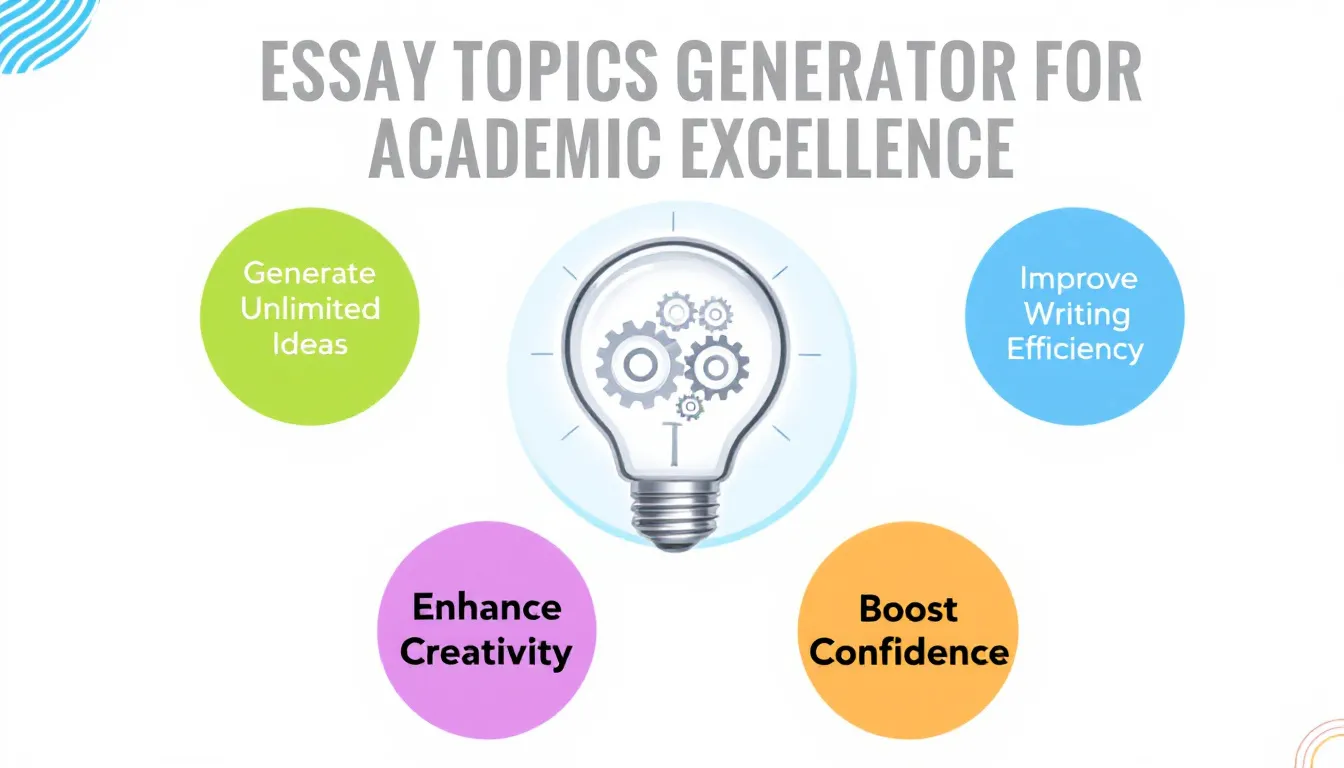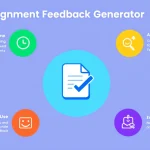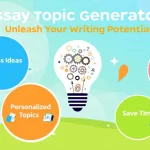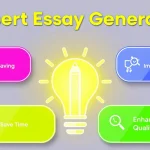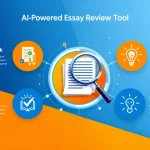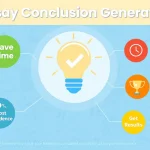Essay Topic Generator
Is this tool helpful?
How to Use the Essay Topics Generator Effectively
This tool helps you brainstorm original, thought-provoking essay topics tailored to your needs. Follow these steps for the best results:
- Enter the Subject: Type the main theme or subject for your essay. For example, you can enter “Renewable Energy Technologies” or “The Harlem Renaissance”.
- Provide Assignment Guidelines (Optional): Add any specific instructions or focus areas related to your assignment. Examples include “Include case studies from 2000 onwards” or “Discuss social and economic impacts”.
- Specify Number of Topics (Optional): Choose how many essay topics you want to generate, between 1 and 10. If left blank, the default is 5.
- Generate Topics: Click the button to create your list of customized essay topics.
- Review and Choose: Examine the generated topics and select the one that fits your interests and assignment requirements.
This tool produces unique, engaging topics that encourage deep analysis and showcase your academic thinking.
Introduction to the Essay Topics Generator: Definition, Purpose, and Benefits
What Is the Essay Topics Generator?
This tool acts as a personalized brainstorming assistant, generating a range of original essay topics based on the subject and any additional guidelines you provide. It serves to spark your creativity, reduce writer’s block, and help you quickly find ideas suited to your academic goals.
Why Use This Essay Topic Generator?
- Save Time: Quickly get relevant topic ideas without spending hours brainstorming.
- Stimulate Creativity: Discover perspectives and angles you might not have considered.
- Tailored Suggestions: Customize the topics based on assignment requirements and academic standards.
- Versatile: Works across a wide range of subjects and academic disciplines.
- Improve Academic Quality: Encourages topics suitable for critical thinking, research, and strong argumentation.
Practical Uses of the Essay Topics Generator
This tool fits diverse academic needs, letting you generate ideas for essays, research proposals, or interdisciplinary projects. Here are some examples:
Interdisciplinary Projects
If you’re working at the intersection of fields, the generator combines themes for richer topics. Inputting “Climate Change and Public Policy” can generate topics like:
- “Evaluating the Effectiveness of Carbon Pricing Policies in Developed Countries”
- “The Role of Urban Planning in Climate Change Adaptation Strategies”
- “Public Opinion and Policy Formation in Climate Change Mitigation”
Literary Analysis Essays
When studying literature, the tool helps you approach texts from fresh angles. For example, with a subject like “George Orwell’s 1984”, you might see topics such as:
- “The Representation of Surveillance and Privacy in 1984: A Social Critique”
- “Power and Language: How Newspeak Shapes Reality”
- “Resistance and Rebellion: Individual vs. State in Orwell’s Dystopia”
Current Events and Social Issues
Use the tool to analyze and propose solutions for modern challenges. For “Urban Poverty”, example topics include:
- “The Impact of Affordable Housing Policies on Urban Poverty Reduction”
- “Access to Education as a Key Factor in Breaking the Cycle of Urban Poverty”
- “Community-Led Initiatives for Improving Social Services in Low-Income Neighborhoods”
Scientific and Technical Research Proposals
For scientific assignments, the generator helps you focus research questions. With an input like “Artificial Photosynthesis”, generated topics might be:
- “Evaluating Catalyst Efficiency in Artificial Photosynthesis Systems”
- “Designing Sustainable Materials for Enhancing Solar Energy Capture”
- “Techno-Economic Analysis of Artificial Photosynthesis for Fuel Production”
Philosophical and Ethical Debates
Philosophy students can explore complex issues generated by the tool. An input such as “Bioethics and Genetic Engineering” could yield topics like:
- “Ethical Boundaries in Human Genetic Editing: Balancing Innovation and Risk”
- “The Role of Consent in Genetic Modification Practices”
- “Implications of Designer Babies on Social Justice and Equality”
Maximizing Your Results: Tips for Using the Essay Topics Generator
- Be Specific with Your Subject: Narrow your input for targeted topics. Instead of “Psychology”, try “Cognitive Behavioral Therapy for Adolescents”.
- Include Assignment Details: Use the guidelines field to highlight requirements like “focus on recent studies” or “compare two contrasting theories”.
- Experiment with Different Inputs: Run multiple queries with varied phrases for more diverse ideas.
- Adapt and Customize: Use the generated topics as inspiration—feel free to combine or tweak them to fit your style and assignment.
- Conduct Preliminary Research: Check available sources before settling on a topic to ensure sufficient material for your essay.
Frequently Asked Questions About the Essay Topics Generator
1. Can I use the generated topics as they are?
You can use the exact topics. However, customizing them to better fit your interests or assignment requirements can improve your essay’s focus and originality.
2. How original are the topics?
The tool generates unique combinations of ideas using advanced algorithms. While some topics might overlap with existing ones, your approach and analysis create the true originality.
3. Is the tool suitable for all subjects?
Yes, it works for various academic disciplines. For very niche areas, inputting broader related terms helps generate useful topic ideas that you can then refine.
4. How many times can I use the tool?
There’s no limit. Generating multiple sets of topics helps explore different angles of your subject.
5. Will using this tool affect my essay’s originality?
The tool provides inspiration, not content. Your research, reasoning, and writing make your work original.
6. Can the tool assist with group projects?
Yes. It’s useful for brainstorming ideas your group can discuss and refine collaboratively.
7. How does the tool ensure topics fit academic standards?
The generated topics encourage logical argumentation and in-depth exploration, aligning with scholarly expectations for essays.
8. Does the tool help with thesis statements?
It doesn’t create thesis statements directly, but the specific angles suggested help you formulate strong, concise theses.
9. Is this generator suitable for all academic levels?
Yes. Whether you’re in high school or university, the tool provides ideas that you can develop according to your study level.
Important Disclaimer
The calculations, results, and content provided by our tools are not guaranteed to be accurate, complete, or reliable. Users are responsible for verifying and interpreting the results. Our content and tools may contain errors, biases, or inconsistencies. Do not enter personal data, sensitive information, or personally identifiable information in our web forms or tools. Such data entry violates our terms of service and may result in unauthorized disclosure to third parties. We reserve the right to save inputs and outputs from our tools for the purposes of error debugging, bias identification, and performance improvement. External companies providing AI models used in our tools may also save and process data in accordance with their own policies. By using our tools, you consent to this data collection and processing. We reserve the right to limit the usage of our tools based on current usability factors.
